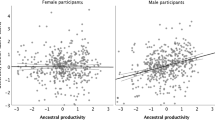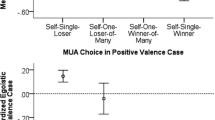Abstract
Two factors, the type of relationship between the involved parties and the justification of the decision maker for being in his or her position, are predicted to influence resource allocation decisions. These predictions are based on a synthesis of several forces, including self-interest, a politeness norm, and a norm of reciprocity, that we argue underlie the selection of allocation norms that guide interdependent resource allocation decisions. An ultimatum bargaining game, in which player 1 divides a resource ($10) and player 2 decides to either reject or accept this division, is employed in a laboratory study to test the hypotheses. For subjects in the player 1 position, subjects with friends as player 2 or those assigned to their position randomly allocated lower amounts of money to themselves than did subjects with strangers as player 2 or those who earned their position. Friends in the player 2 position demanded significantly less to reach an agreement than strangers. These and other results are discussed in terms of the various allocation norms, particularly equity and equality, that appeared to influence subjects' decisions.
Similar content being viewed by others
References
Adams, J. (1965). “Inequity in Social Exchange.” In L. Berkowitz (ed.),Advances in Experimental Social Psychology Vol. 2. New York: Academic Press.
Alchian, A., and H. Demsetz. (1972). “Production, Information Costs, and Economic Organization”.American Economic Review 62, 777–795.
Austin, W. (1980). “Friendship and Fairness: Effects of Type of Relationship and Task Performance on Choice of Distribution Rules.”Personality and Social Psychology Bulletin 6, 402–408.
Bagarozzi, D. (1982). “The Effects of Cohesiveness on Distributive Justice”.Journal of Psychology 110, 267–273.
Clark, M., and J. Mills. (1979). “Interpersonal Attraction in Exchange and Communal Relationships.”Journal of Personality and Social Psychology 37, 12–24.
Clark, M.S., J.R. Mills, and D.M. Corcoran. (1989). “Keeping Track of Needs and Inputs of Friends and Strangers.”Personality and Social Psychology Bulletin 15, 533–542.
Cook, K., and K. Hegtvedt. (1983). “Distributive Justice, Equity, and Equality.”Annual Review of Sociology 9, 217–241.
Deutsch, M. (1975). “Equity, Equality, and Need: What Determines Which Value Will Be Used for Distributive Justice?”Journal of Social Issues 31, 137–150.
Dwyer, F.R., P. Schurr, and S. Oh. (1987). “Developing Buyer-Seller Relationships.”Journal of Marketing 51, 11–27.
Friedman, M. (1953).Essays in Positive Economics. Chicago: University of Chicago Press.
Fry, W., I. Firestone, and D. Williams. (1983). “Negotiation Process and Outcome of Stranger Dyads and Dating Couples: Do Lovers Lose?”Basic and Applied Social Psychology 4, 1–16.
Gouldner, A. (1960). “The Norm of Reciprocity: A Preliminary Statement.”American Sociological Review 25, 161–179.
Guth, W., R. Schmittberger, and B. Schwarze. (1982). “An Experimental Analysis of Ultimatum Bargaining.”Journal of Economic Behavior and Organization 3, 367–388.
Guth, W., and R. Tietz. (1990). “Ultimatum Bargaining Behavior: A survey and comparison of experimental results.”Journal of Economic Psychology 11, 417–449.
Homans, G. (1961).Social Behavior. New York: Harcourt, Brace and World.
Jensen, M., and W. Meckling. (1976). “Theory of the Firm: Managerial Behavior, Agency Costs, and Ownership Structure.”The Journal of Financial Economics 3, 305–360.
Kahneman, D., J. Knetsch, and R. Thaler. (1986). “Fairness and the Assumptions of Economics.”Journal of Business 59, 285–300.
Lamm, H., and E. Kayser. (1978). “The Allocation of Monetary Gain and Loss Following Dyadic Performance: The Weight Given to Effort and Ability Under Conditions of Low and High Intradyadic Attraction.”European Journal of Social Psychology 8, 275–278.
Macneil, I.R. (1980).The New Social Contract: An Inquiry into Modern Contractual Relations. New Haven, CT: Yale University Press.
Messick, D.M., and K. Sentis. (1983). “Fairness, Preference, and Fairness Bias.” In D.M. Messick and K.S. Cook (eds.),Equity Theory: Psychological and Sociological Perspectives. New York: Praeger Publishers.
Mikula, G., and T. Schwinger. (1978). “Intermember Relations and Reward Allocation: Theoretical Considerations of Affects.” In H. Brandstatter, H. Davis, and H. Schuler (eds.),Dynamics of Group Decisions. Beverly Hills, CA: Sage.
Northcraft, G.B., and M.A. Neale. (1990).Organizational Behavior: A Management Challenge. Chicago: The Dryden Press.
Rawls, J. (1971).A Theory of Justice. Cambridge, MA: Harvard University Press.
Roloff, M.E. (1987). “Communication and Reciprocity Within Intimate Relationships.” In M.E. Roloff and G.R. Miller (eds.),Interpersonal Processes. Newbury Park, CA: Sage.
Schwinger, T. (1980). “Just Allocations of Goods: Decisions Among Three Principles.” In G. Mikula (ed.),Justice and Social Interaction: Experimental and Theoretical Contributions from Psychological Research. New York: Springer-Verlag.
Shapiro, E. (1975). “Effect of Expectations of Future Interaction on Reward Allocations in Dyads: Equity or Equality.”Journal of Personality and Social Psychology 31, 873–880.
Smith, A. (1937).The Wealth of Nations, Cannan edition. New York: Modern Library. Originally published 1776.
Steil, J.M., and D.G. Makowski. (1989). “Equity, Equality, and Need: A Study of the Patterns and Outcomes Associated with Their Use in Intimate Relationships.”Social Justice Research 3, 121–137.
Thibaut, J., and L. Walker. (1975).Procedural Justice: A Psychological Analysis. Hillsdale, NJ: Erlbaum.
Valley, K. (1992). “Relationships and Resources: A Network Exploration of Allocation Decisions.” Unpublished dissertation, Kellogg Graduate School of Management, Northwestern University.
Author information
Authors and Affiliations
Rights and permissions
About this article
Cite this article
Polzer, J.T., Neale, M.A. & Glenn, P.O. The effects of relationships and justification in an interdependent allocation task. Group Decis Negot 2, 135–148 (1993). https://doi.org/10.1007/BF01884768
Issue Date:
DOI: https://doi.org/10.1007/BF01884768




